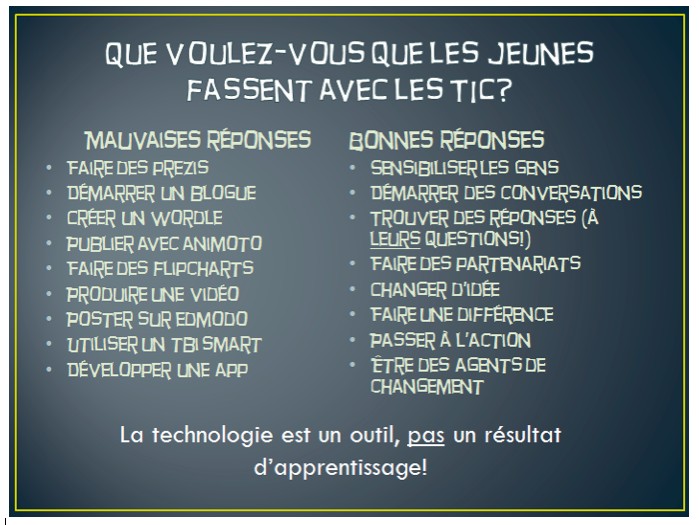Beaucoup de gens du milieu scolaire croient que les élèves sont très engagés quand ils utilisent la technologie. Cependant, sont-ils vraiment engagés dans la tâche, ou sont-ils tout simplement excités par la nouveauté? Voici différentes pistes de réflexion sur la question.
Le 28 février dernier, la soirée TEDxWilfridBastienEd sur l’éducation a eu lieu à Montréal. L’un des conférenciers était l’enseignant et auteur Yves Nadon. Il y a raconté comment, depuis les 30 dernières années, il a vu l’arrivée de plusieurs technologies dans les écoles. L’arrivée de ces technologies était toujours accompagnée de grandes promesses de transformation et de motivation, mais il n’a jamais vu aucune de ces promesses se réaliser, ou très peu. On peut écouter ici sa présentation hautement inspirante. Donc, la technologie ne serait pas l’ingrédient magique pour augmenter l’engagement de nos élèves. Alors que faire?
George Couros, directeur à l’innovation en enseignement et en apprentissage pour le Parkland School Division, en Alberta, est en train d’écrire une série d’articles sur les mythes reliés à la technologie en préparation d’une présentation qu’il donnera à la prochaine conférence ISTE 2014, qui se tiendra à Atlanta. Voici un bref résumé de son article The Myths of Technology Series – “Technology Equals Engagement” qui s’intéresse particulièrement à cette question de l’engagement.
Selon lui, il est important de faire la distinction entre excitation face à la nouveauté et engagement. Une observation rapide peut nous montrer que les deux réactions sont similaires au début, mais il y en a une qui s’estompe rapidement. L’effet de nouveauté est toujours excitant et stimulant. Pourtant, cette exaltation se perd rapidement.
George Couros nous amène ensuite sur une autre piste en mettant en lumière la différence entre l’engagement et l’empowerment. Ce terme anglais est difficile à traduire, mais il tourne autour de l’idée de donner plus de pouvoir à un individu. Pour bien le comprendre, il propose aux lecteurs une simple distinction :
Conformité : « tu le fais parce que je te dis de le faire »
Engagement : « tu le fais parce que tu es excité ou motivé »
Empowerment : « tu le fais parce que tu sens que tu as le pouvoir de faire quelque chose de significatif »
La nuance est que la motivation et l’engagement sont beaucoup moins puissants que l’empowerment, qui donne le sentiment à l’élève de faire une différence dans sa vie, et peut-être celles des autres.
Selon lui, la technologie ne devrait pas servir à augmenter l’engagement et la motivation, mais plutôt le pouvoir que les élèves ont de faire une différence.
Pour terminer, le technopédagogue Jacques Cool a fait une traduction libre d’une image de Bill Ferriter dans son article « L’éducation au 21e siècle : nous sommes tous des apprenants ! ». Selon M. Ferriter, nous ne sommes encore qu’au premier degré de ce que la technologie nous permet de faire. Ce premier degré essaye seulement d’augmenter l’excitation ou la motivation/engagement des élèves. Sommes-nous prêts à donner du pouvoir aux élèves pour que leurs apprentissages deviennent signifiants?







